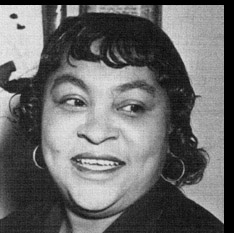by Uncle Dave Lewis
 Hociel Thomas was the daughter of pioneering blues and boogie woogie pianist
George W. Thomas, and the niece of legendary blues singer Sippie Wallace.
Born in Houston, from the age of 12 Hociel Thomas was raised by her aunt in
the Storyville red-light district in New Orleans. Hociel inherited both her
aunt's singing ability and her father's talent as a barrelhouse pianist, and
this helped her earn her own keep. Sometimes Hociel and Wallace worked as a
team, and in 1923 they relocated to Chicago together. Hociel made her first
records fronting a group led by her nephew, Hersal Thomas, in early 1925,
and thier duet recording made at Okeh, "Worried Down with the Blues," did
well. When Louis Armstrong came back to Chicago after a year-long stint with
Fletcher Henderson, he recorded with Hersal Thomas in a session backing
Hociel; the next day the first "Hot Five" sides were made. But these records
with Armstrong, for various reasons, were not the best showcase for Hociel
Thomas' talents, leading to her reputation among jazz buffs that she was not a good
singer. She would do better in a trio session with Armstrong and Hersal
Thomas held in February, 1926, but these would prove her last records for
two decades. Hersal Thomas died later that year at the age of 20, and Hociel
dropped out of show business. Hociel Thomas was the daughter of pioneering blues and boogie woogie pianist
George W. Thomas, and the niece of legendary blues singer Sippie Wallace.
Born in Houston, from the age of 12 Hociel Thomas was raised by her aunt in
the Storyville red-light district in New Orleans. Hociel inherited both her
aunt's singing ability and her father's talent as a barrelhouse pianist, and
this helped her earn her own keep. Sometimes Hociel and Wallace worked as a
team, and in 1923 they relocated to Chicago together. Hociel made her first
records fronting a group led by her nephew, Hersal Thomas, in early 1925,
and thier duet recording made at Okeh, "Worried Down with the Blues," did
well. When Louis Armstrong came back to Chicago after a year-long stint with
Fletcher Henderson, he recorded with Hersal Thomas in a session backing
Hociel; the next day the first "Hot Five" sides were made. But these records
with Armstrong, for various reasons, were not the best showcase for Hociel
Thomas' talents, leading to her reputation among jazz buffs that she was not a good
singer. She would do better in a trio session with Armstrong and Hersal
Thomas held in February, 1926, but these would prove her last records for
two decades. Hersal Thomas died later that year at the age of 20, and Hociel
dropped out of show business.
In 1946 Hociel Thomas turned up in Oakland, California, and was recorded by
Rudi Blesh's Circle Records singing, playing piano and in duets with Mutt
Carey. Her work on these records is extraordinary - she was a soulful, "seen
it all" vocalist and her piano playing is strongly rooted in the tradition
of her father. For some months she joined the San Francisco revival scene
and appeared with Kid Ory's Creole Orchestra. But this all came to end when Thomas was
charged with murder after a fight with one her sisters turned fatal,
blinding Hociel in the process. Although Hociel Thomas was acquitted of
these charges, she only outlived her release from jail by a couple of years.
Hociel Thomas was a pioneer of jazz who was in all practical purposes
present right after its birth, and in the center of it. But for Thomas, the
spotlight shone none too brightly, and only once in awhile.
|
